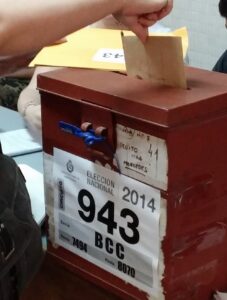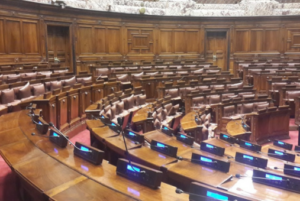During 2024, Uruguay, like other Latin American countries, is holding electoral campaigns ahead of October presidential elections. Concerned about political polarization –at a global level–, congressmen from the ruling party are trying to penalize the creation and dissemination of misleading content during this period.

Voting ballot box in the 2014 general elections in Uruguay (Fisicamartin, CC BY-SA 4.0, via Wikimedia Commons)
The bill, which was recently presented by congressmen Rodrigo Goñi, Sebastián Cal and Felipe Schipani, contains a unique article.
With it, they seek to punish anyone who creates or disseminates materially misleading content through images, sounds or videos, with the purpose of causing harm to a candidate or producing noticeable disinformation in relation to election season. The penalty would range from six months to two years in prison.
The period established by the project is limited to three months before the presidential elections and one month after that date. The text of the bill also clarifies that it will not constitute criminal conduct when the content is a parody or satire, and that the media and digital platforms are exempt from liability.
In dialogue with LatAm Journalism Review (LJR), Goñi expressed that the bill focuses on false news generated with artificial intelligence (AI), also called deep fakes.
“AI enhances the capacity for falsification, in this case by making political candidates say and do things that they have not said or done in a way that it’s almost impossible to tell whether it’s real or not,” he said. This is why the congressman is concerned about society’s widespread access to this tool, and the important role of social networks in public debate and in electoral campaigns.
Local civil society organizations that defend freedom of expression and the right to public information have rejected the proposal for not complying with international standards on the matter. They say that criminalization is not the solution to the creation and dissemination of false content.
Goñi said that there is willingness in Parliament to move forward with the proposal and that they hope it will be approved before the presidential elections in October in Uruguay.
Artificial Intelligence and election season in Uruguay
“There is no serious organization in the world that does not warn of the serious risks of fake news for the transparency of an electoral campaign and the eventual distortion of popular will,” Goñi said.
The legal regulation on the creation and dissemination of fake news, according to the Uruguayan congressman, seeks to minimize the problem and prevent the risk that it may cause.
Furthermore, he said that criminal sanction is the correct way to punish because in “a world where [political] polarization is the rule, we are capable of anything to annihilate the adversary. Will a financial penalty be enough? I do not think so.”
The important thing, for Goñi, is not only the information, but “the authenticity and veracity of what is said as an essential social value for coexistence.”
The congressman said that he practices “anticipatory governance,” a way of preventing the risks that may arise, in this case, the use of AI to create false news about candidates.
Impact on freedom of expression and journalistic practice
“Proposing jail time for the creation and dissemination of false news is something that has not been done for many years in the region and that goes against all international standards of freedom of expression,” Fabián Werner told LJR.
The president of the Center for Archives and Access to Public Information (Cainfo), a local organization that was present in the parliamentary commission where the proposal was discussed, said that this “bill is totally disproportionate. A measure that aims to attack or combat a situation that today does not exist in those dimensions in Uruguay.”

Chamber of Deputies of the Legislative Palace in Uruguay (Nachy7, CC BY-SA 4.0, via Wikimedia Commons)
Gustavo Gómez, director of Observacom, said the same thing about the creation and dissemination of fake news or deep fakes during election season in Uruguay.
“None of us who went to the hearings said that this is a problem or a threat in the country. There are no widespread phenomena of the use of bots and trolls to affect candidates, political parties or governments,” he told LJR.
Gómez also does not think it is appropriate to “approve a law every time a technology appears, and in this case it is not a technology, it is a reaction to the creation of deep fakes.”
Werner warned that it will be very difficult to track down who has created and spread false news, in addition to “creating a privileged forum for candidates of political parties, when international standards say otherwise, since people in politics during election season are under their greatest scrutiny.”
Another point made by the president of Cainfo about the bill is that people are going to censor themselves before publishing an opinion or news about a candidate.
“There is a danger of being sent to jail when electoral campaigns should be a lively and vibrant debate where people participate and exchange opinions,” he added.
That's why Werner said that "the main consequence of a law like this is the possibility of people choosing not to participate in public debate."
Gómez added that the regulations, due to their vagueness and lack of precision, will affect freedom of expression, including journalistic practice, because a journalist can spread false content that is so well done that he or she does not realize that it is false.
Gómez said there may be sanctions for the creation of false news, but that they do not have to be criminal, they can be civil sanctions, fines, or reparatory sanctions. For example, instead of downloading the content, mark it, give it context and warn the user that this content is manipulated.
Both Gómez and Werner said that transparency should be required from social media platforms, because they can be very useful in providing information to identify people who create a publication with false content. However, the bill proposed by Goñi and other congressmen, according to Werner, completely exempts the platforms.
Recommendations to prevent and attack disinformation on social networks
The president of Cainfo made some recommendations to prevent and combat the creation of false news outside the criminal sphere.
The first thing he said is that it is “inevitable to negotiate with the platforms” of social networks, since they are the great intermediaries between creators and audiences.
“The platforms benefit because those who spread false news pay for it. There is an immense business there, so a solution that includes the platforms must be negotiated,” he added.
He also referred to “digital literacy” as a path that other countries have already taken to educate in the use of social networks. And in the event that the crime has already occurred, Werner considered that it is more appropriate to go through civil proceedings, rather than criminal proceedings.
In addition, the General Assembly of the Organization of American States (OAS) has a guide to guarantee freedom of expression against deliberate disinformation in electoral contexts that can be viewed here.